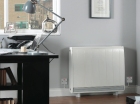Electric heating for the future

Low-carbon electricity can automatically deliver low-carbon heating, but managing demand to match the availability of electricity is an important part of the strategy, explains Chris Stammers of Dimplex.
The UK’s energy landscape is changing. With spiralling costs and ageing power stations coming to the end of their lifespans, some creative thinking is needed to ensure homes and businesses have enough power to function effectively. A key solution to managing our energy requirements is likely to come not from some untested and unfamiliar technology, but from a new generation of tried-and-trusted storage heating appliances.
DECC’s heat strategy of March 2012 outlines the electrification of heating as a major step towards meeting the UK’s tough carbon-emission reduction targets, in conjunction with decarbonisation of the grid through nuclear and renewables.
However, there is no denying that intermittency is a problem with much renewable generation — i.e. these sources are not available all the time. A ‘smart grid’ is in development to help make better use of off-peak and intermittent energy sources, assisting suppliers with demand-side management — essentially, balancing supply from multiple sources with demand so that one does not outstrip the other.
One of the challenges of moving to electric heating demand, whether in the form of heat pumps or conventional resistance heating, lies in the UK’s overall increasing demand for electricity.
In July this year DECC issued figures looking at energy use in the services sector — consisting of retail, warehousing, offices, education, hotel and catering, etc. They show that the requirement for heating constituted a hefty 45% of total energy use in this sector.
Although total demand from the services sector is reducing, due to the economic slowdown and other factors, the grid is under unrelenting pressure from the increasing requirements of the domestic sector. Between 1990 and 2010, the UK’s electricity consumption from consumer electronics increased by 74%, despite the introduction of more energy-efficient technologies, pointing to a huge proliferation of gadgets.
Increasing the use of off-peak energy for heating in both the commercial and domestic sectors could make demand-side management significantly less of a headache for energy suppliers. The issue of heating load is a major factor when calculating projected demand levels, and electric heating that can directly use or store off-peak energy is attracting attention from utility companies.
Options are being explored not just for space heating to reduce peak winter load, but also for water heating, which, of course, is required year-round and could make a sizeable contribution to shifting the load to off-peak periods every day of the year.
As well as smoothing out energy requirements at a national level, appliances that use off-peak electricity bring other benefits. Off-peak tariffs offer the lowest running cost, with unit prices as low as 6.03 p/kWh compared with around 14 p/kWh during the day, and the lowest carbon intensity, since wind and nuclear contribute a bigger percentage of off-peak electricity generated at these times. Apart from some hydro-electric generation, it is mainly fast-response fossil-fuel power stations which are fired up to meet extra daytime demand, boosting the electricity’s carbon footprint.
 |
| The control of modern storage heaters such as Dimplex’s Quantum can closely match target room temperatures throughout a 24-hour day. |
However, despite the cost savings and big-picture benefits available from utilising off-peak tariffs, the concept of storage heating is not necessarily a popular choice with users. Historically, it had the reputation of overheating in the early part of the day, and needing topping up from additional direct-acting heating in the evening.
However, advances in insulation and electronics of appliances, and intelligent user-friendly controls, mean that the latest generation of storage appliances can match target room temperature very closely throughout the day — avoiding overheating the room in the morning, maintaining a comfortable temperature during the day and evening, and allowing the temperature to drop back to a comfortable background temperature overnight.
Improved performance is just one aspect of how the technology can be used. As real-time communication with the smart grid grows in importance with a view to allowing renewables and off-peak resources to be used to maximum advantage, utility companies such as SSE have been collaborating with Dimplex to help develop the Quantum Energy System, a range of super-efficient space- and water-heating appliances for domestic and commercial use, controlled by the Quantum Hub, an intelligent and completely automatic system manager.
Using wireless radio-frequency technology, this hub requires no user input to maintain communication between the building’s storage appliances and the energy-supply utility, automatically switching to the cheapest and most efficient energy sources, around the clock. Used at scale, this technology offers real potential to facilitate grid balancing for improved efficiencies nationwide.
It is clear that the way we supply and use energy has to change or we are in real danger of running into severe energy shortages, with devastating impact on businesses, home owners and the wider economy. Electric heating run from an increasingly decarbonised grid is a significant part of the Government’s favoured solution, but it is the way we manage the use of ‘clean’ electricity which will be really key in ensuring our energy future — and the good news is that this quantum leap towards achieving that aim is already in progress.
Chris Stammers is marketing director with Dimplex.








